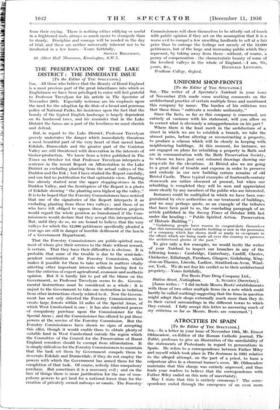THE PRESERVATION OF THE LAKE- DISTRICT: THE IMMEDIATE ISSUE [To
the Editor of TI1E SPECTATOR.] Sta,—All those who believe that the Beauty of Rural England is a most precious part of the great inheritance into which as Englishmen we have been privileged to enter will feel grateful to Professor Trevelyan for his article in The Spectator of November 20th. Especially welcome are his emphasis upon the need for the adoption by the Stale of a broad and generous policy of National Parks, his insistence upon the fact that the beauty of the typical English landscape is largely dependent on its hardwood trees, and his reminder that in the Lake District the farms arc a part of the loveliness we must cherish
and defend.
But, in regard to the Lake District, Professor Trevelyan
gravely underrates the danger which immediately threatens a most beautiful part of the very heart of that sacred land. Eskdale, . Dunnerdale and the greater part of the Coniston Valley are still threatened with desecration in the interests of timber-production. We know from a letter published in The Times on October 1st that Professor Trevelyan interprets a sentence in the recent Report on Afforestation in the Lake District as excluding planting from the actual valleys of the Duddon and the Esk ; but I have studied the Report carefully, and can find no justification for that optimistic view. Planting has already started near the upper stepping-stones in the Duddon Valley, and the frontispiece of the Report is a photo of Eskdale showing "the planting area highest up the valley." It is to be hoped that the Forestry Commissioners have noticed that one. of the signatories of the Report interprets it as excluding planting from these two valleys ; and those of us who have felt obliged to oppose these afforestation projects would regard the whole position as transformed if the Com- missioners would declare that they accept this interpretation. But, until they. do so, we are bound to believe that the very valleys for which the 12,000 petitioners specifically pleaded a year ago are still in danger of horrible defilement at the hands of a Government Department.
That the Forestry Commissioners arc public-spirited men,
most of whom give their services to the State without reward, is certain. That they have their difficulties is obvious. It is probable that some of the trouble is due to the semi-inde- pendent constitution of the Forestry Commission, which makes it possible for them to take action in matters vitally affecting other important interests without having first to face the criticism of expert agricultural, economic and aesthetic opinion. But it is hardly fair to put all the :blame on the. Government, as Professor Trevelyan seems to do. Govern- mental instructions must be considered as a whole : it is unjust to the Government to take one instruction in isolation from other instructions closely related to it. Now the Govern-. ment has not only directed the Forestry Commissioners to create large forests within 15 miles of the Special Areas, of ; which West Cumberland is one :, it has also conferred powers- of compulsory : purchase upon the, Commissioner for the Special Areas ; and the Commissioner has offered to put those powers at the service of the Forestry Commission. But the Forestry ,C-Otrunissioners have shown no signs of accepting this offer, though it would- enable them to obtain plenty of • suitable land in West Cumberland outside the region*. which • the Committee of the Council for the -Preservation -a Rural ; England considers should be exempt from afforestation. It.- is simply ridiculous for the Forestry Commissionersio maintain ; that the- *task- set- them. by Government compels. Ultra to desecrate Eskdale and Dunnerdale, if ithey..do not employ the
powers with tch the Government has arme&them for the.. . . _
completion of that task. Of course, nobody likes Compulsory' - purchase. But ,sometimes it is,.a necessary evil; and on the face of things there is more justification for the use of com- pulsory -powers to get land for a national forest than for the creation of privately owned -railwa-ys-er-cattals,---The--Forestry- Commissioners will show themselves to be utterly out of touch with public opinion if they act on the assumption that it is -a worse evil to compel a few, unwilling landlords to sell at a fair price than to outrage the feelings not merely of the 12,000 petitioners, but of the large and increasing public which they represent, by. taking away from them—without, of course, a penny of compensation—the characteristic beauty of some of the loveliest valleys in the whole of England.—I am, Sir,
















































 Previous page
Previous page